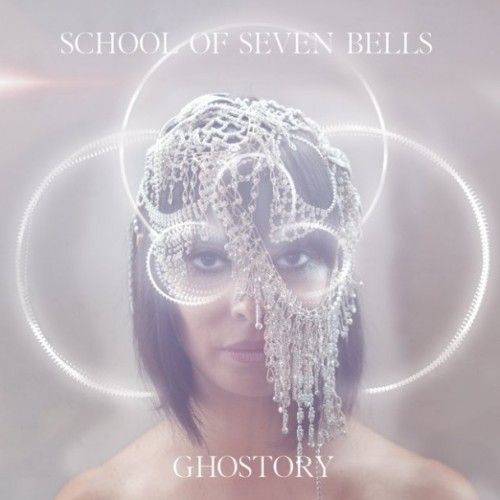School of Seven Bells, "Ghostory"
 Now on their third full-length, School of Seven Bells have evolved into playing a sleek, manicured style of dream-pop constructed with the live experience in mind. While I have mixed feelings on the album start to finish, Ghostory does contain some powerful moments within its palette of sounds.
Now on their third full-length, School of Seven Bells have evolved into playing a sleek, manicured style of dream-pop constructed with the live experience in mind. While I have mixed feelings on the album start to finish, Ghostory does contain some powerful moments within its palette of sounds.
School of Seven Bells began five years ago as a collaboration between guitarist/producer Benjamin Curtis (ex-Secret Machines) and twin sisters Alejandra and Claudia Deheza (ex-On!Air!Library!). Its members met while opening for Interpol on their 2004 world tour, when I first saw both bands play in my college years. Since then, SVIIB have released two excellent albums—Alpinisms and Disconnect from Desire were each among my favorites in their years of release—and continued evolving since then. I have always been impressed by their live show, which trades the ethereal swoon of their albums for a louder, far more physical experience; the addition of a live drummer in 2010 only heightened the impact. Founding member Claudia Deheza left the band shortly thereafter, and Ghostory is SVIIB's first album without her input, leaving the door wide open for a stylistic departure.
As it turns out, SVIIB have simply taken their sound in a more pop/rock direction, rather than change the formula wholesale. The gently ascending, hypnotic melodies that were commonplace on Alpinisms ("Iamundernodisguise," "Prince of Peace") have been phased out, replaced by taut verse-chorus structures all around, each song streamlined for immediate impact and accessibility. The single exception, "Reappear," is a gorgeous piece of ambient songcraft, accented by a blanket of synths and floating vocal melody. The band's signature harmonies, which had been under the spotlight since On!Air!Library!'s self-titled album in 2004, are not frequently present, and when Deheza layers her vocals over one another with studio loops and effects, it feels somehow less organic with only one person in the studio. Mostly, I miss the woozy production of the band's early albums, which leaned toward early '90s shoegaze and dream-pop. Here, those ingredients have been reduced in favor of punchy, rock-centric production, courtesy of Ben Curtis' brother (and former Secret Machines bandmate) Brandon Curtis, as well as more prominent drums.
The standout tracks on Ghostory are those that match, and occasionally exceed, the band's previous experiments with pop song structures. First single "The Night" kicks off the album with style—a bouncy bass line and electronic drums accented by brushstrokes of guitar and Deheza's often unintelligible vocals. Later, "Lafaye" does it one better, its ethereal mood backed by flat-out gorgeous harmonies, its lyrics detailing Lafaye, the album's central character in a generally undetectable story arc: "You have the blood of intuition / with a name that branded you / and the familiar unfamiliar / would be the only thing you knew," before Deheza's cries of "Laaa-fayeeee!" envelop the chorus. "Low Times" and "White Wind" benefit most from the album's driving production, and are well suited to becoming live staples. The sharpest tune is "Scavenger," in which Deheza hurls incisive lyrics at a former lover (or perhaps bandmate): "I know what you are / you're a fake / you're a scavenger / too scared to take part / you only take / 'cause you're a coward."
The closing track on Ghostory, "When You Sing," is one of its best, but also leaves me feeling conflicted. My Bloody Valentine worship is nothing new for SVIIB—check the swooning, tremolo-warped guitars of "Face to Face on High Places" and "Windstorm"—but "When You Sing" takes this to a new level, because its galloping dance rhythm and swirling, euphoric blur of guitars is essentially a Xerox copy of MBV's "Soon." On one hand, I couldn't be more thrilled: "Soon" is one of my favorite pieces of recorded music, and when I turn off my brain and turn up the volume, "When You Sing" hits at least 85% of the same pleasure centers that "Soon" trail-blazed 20 years ago. Still, the whole song feels a bit unoriginal. On past albums, School of Seven Bells cherry-picked a few shoegaze tricks and incorporated them into a unique, compelling sound; "When You Sing" is more akin to loving plagiarism.
Samples:



